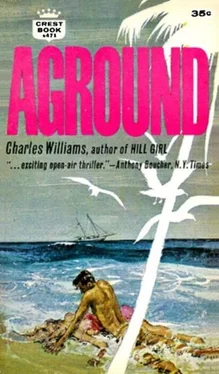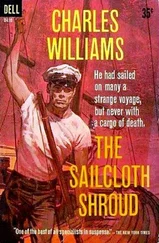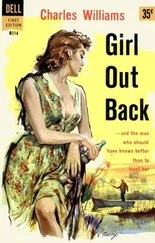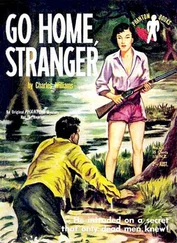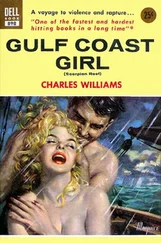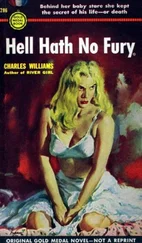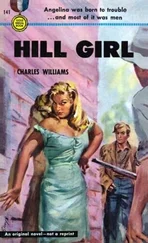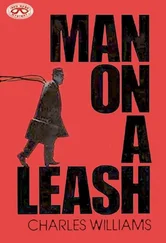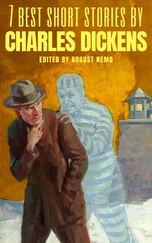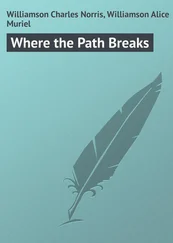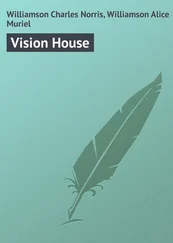“That’s when he went aboard?” Ingram asked.
“Yes. Maybe I’d better tell you about him. It’s not very flattering, but since between the two of us we seem to have dragged you into this, you’re entitled to an explanation. I first met him in 1943 when he was an Army Air Force cadet at an airfield near the little town I came from. He was from Washington—the state, I mean. We were practically in flames over each other right from the first, and he wanted me to marry him before he went overseas. I would have, too, except that I still lacked a few months of being eighteen, and my parents put a stop to it. We carried on a torrid correspondence all the time he was in England, and did get married when he was reassigned to an airfield in Louisiana just before the end of the war. When he was discharged, he decided to go back to school. He wanted to study medicine. He’d already had two years at the University of Washington, before he went in the service. So we moved to Seattle. I got a job, and he tried to start over where he’d left off two years before. It just didn’t work out. Maybe we were both too immature, I don’t know. But that quonset-hut, GI-Bill, all-work-and-no-play type of college life, with another six long years of it staring us in the face before he could even hope to graduate from medical school, was just too much for us. We fought a lot, and he began to fail in all his subjects.” She fell silent for a moment. Then she made a weary gesture, and went on. “We split up. I came back to Texas, and we were divorced that summer—1946. I never saw him again, or even heard of him, until the afternoon four months ago when I was flying to Miami to see about selling the Dragoon. He boarded the plane in New Orleans, and took the seat next to mine.
“Those things when you’re very young are apt to be pretty intense, but no bitterness lasts for thirteen years, and after the first shock wore off it was more like a meeting of old friends than anything. It took us all the way to Tampa to get caught up. I told him what I was going to Miami for, and I’ll have to admit it didn’t lose anything in the way I said it: I was running over to see about disposing of my late husband’s yacht. That was a little childish for a woman almost thirty-five years old, but for some reason I seemed to think I had to impress him—maybe because he was so obviously successful himself. But anyway, that’s probably when he began to form the picture of the wealthy widow.
“He told me about himself. He’d got his M.D. from the University of California medical school and had quite an extensive surgical practice in the San Francisco hospitals—specializing in chest and heart surgery. He was also connected with the medical school as a part-time lecturer on surgical techniques, which brought him to the subject of this trip he was on. It seemed he and some scientist from Cal Tech had worked out a new and more simplified type of heart-lung machine for use in operations where the heart had to be by-passed. I didn’t understand any of it, of course, but it sounded very impressive to me. He was demonstrating it at a series of operations that had been scheduled at a number of medical schools. He’d just been at Tulane, and he was on his way to Miami, and he was as tickled as a young boy when he learned I was living in Houston, because he was going to be in Galveston in another week or so, at the University of Texas medical school.
“You’ve met him. You know what he’s like. He’s a very handsome man with a world of drive and charm, and frankly I was flattered by all the attention he gave me. He took me out for dinner and dancing both nights I was in Miami, and rented a car to drive me down to Key West to look at the Dragoon . We were aboard her most of one afternoon. He gave me a lot of advice about what price to hold out for, and said he had a thirty-five-foot yawl of his own on San Francisco Bay. I knew he had sailed small boats on Puget Sound when he was a boy. He was very sharp with Tango for not keeping the cabins and the decks cleaner, and they got in an argument, which is probably the reason he was sure Tango would remember him if he saw him again.
“Well, to cut a long and humiliating story down to a short and humiliating story, about a week after I got home he showed up in Houston. He was busy down in Galveston during the day, of course, but he took me out somewhere every night, and told me a lot more about himself. He was a lonely and unhappy man. He said he’d been married again but it hadn’t worked out, and he was divorced now. Of course, by this time I’d dispelled the myth of the wealthy widow, but still one of the most infuriating parts of the whole thing was the precise way he sized up just exactly how much he could take me for. Seven thousand, five hundred dollars. Any more and I might have balked because I couldn’t afford it. Any less and it might not have been worth all his trouble. Apparently he must have spent his days appraising everything I owned, like a professional weight-guesser.
“The actual mechanics of the swindle were simple enough. He and the Cal Tech scientist were forming a small company to produce around a hundred of the heart-lung machines already contracted for by hospitals all over the country, and one of the original five stockholders had dropped out. And while there was no question that the company would make a great deal of money, the main thing was to be careful about letting control fall into the hands of sordid businessmen who might try to cut corners and cheapen the machine. So for the sake of having the odd share in the hands of somebody with sympathy and understanding, and for old times’ sake . . . You can take it from there. I gave him a check for seventy-five hundred dollars. After two days went by without any word from him, I called the dean’s office at the medical school, and of course they’d never heard of anybody named Patrick Ives. I hired a private detective agency to find out if there was any truth in anything he said. There wasn’t. He was wanted in several places on the Coast and in the Middle West for cashing worthless checks, always posing as a doctor. This was probably the first time he’d used his real name for years, and then only to me. And when the Miami police told me about that watch found in the Dragoon’s dinghy I had a feeling it must be his.”
Ingram nodded. “And you thought if you could catch up with him you might get some of the money back?”
“No. It was four months ago, and the way he lives he’d have spent it all by now. I just wanted to try to get the schooner back, to salvage something out of the mess. I’d been kicked where it hurt—right in the pride—and I was pretty bitter about it. I think I even took some of it out on you, that first night. When you said you weren’t going to charge me anything for helping me find her, I didn’t believe you, frankly. I thought you had an angle too. Great little judge of character, this Osborne girl.”
“Well, you couldn’t be blamed too much for believing him,” he said. “After all, he wasn’t a thief when you knew him before.”
“Don’t be so modest, Ingram. I was talking about how wrong I was about you.”
“Apparently there was an epidemic of it that night. I was wrong too. In fact, I was convinced I wasn’t going to like you, so I may have set a new record for being mistaken.”
Her face was a pale blur across from him in the thickening dusk. “Thanks, Skipper.”
He came alert then, suddenly aware it had been twenty minutes or more since they’d heard a shot from Morrison. Goofing off, he chided himself; they could get themselves killed. “We’d better get on the ball,” he said. “There are two ways Morrison can get aboard now—up the bobstay under the bowsprit, or up this anchor warp. Either way, though, he’ll make enough noise so we can hear him if we’re listening. I’ll be working back here, so you go forward. Lie down on the port side of the forward deckhouse and just listen. If you hear anything at all, sing out.”
Читать дальше
